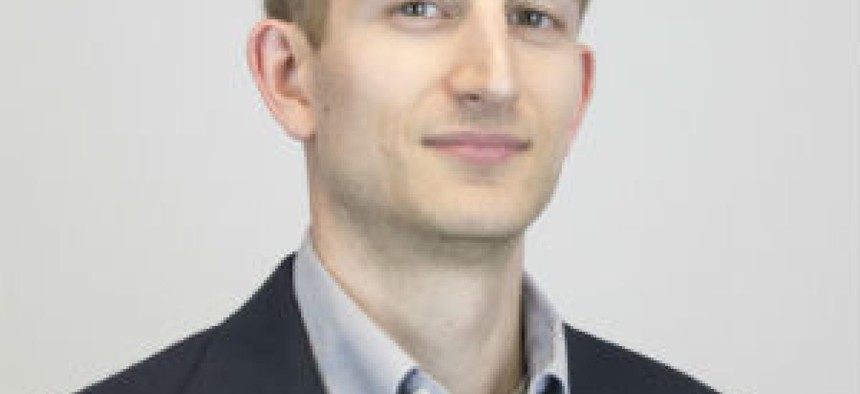How LMI's new CEO learned about their culture (from a distance)

The entire interview process for new LMI CEO Doug Wagoner was virtual and that is also how he is learning about the company's culture. Preserving that culture in a COVID world is top of mind for Wagoner and here is a glimpse at the company's efforts.
Doug Wagoner had not been working full-time for nearly three years when he got the initial pitch in early summer to gauge his interest in the chief executive role at government consultancy LMI.
Not that Wagoner was fully retired as he served on various boards of directors after he left Science Applications International Corp. in 2017 and was pretty happy with that. The recruiter who called Wagoner even started the description of LMI's opening by saying “you’re probably not interested” in the role.
That recounting was part of Wagoner’s response when I asked him what he knew about Tysons, Virginia-based LMI over the course of his nearly three-decade government market career. Below is how Wagoner said he interrupted the recruiter:
“No, no, timeout: that is a legendary company, has always done great work, really smart people, I want to learn more,” Wagoner said.
His interruption and later in conversations with LMI’s board of directors and learning more about the firm's strategy, led him to take the job and start there in August amid the coronavirus pandemic that sent nearly every organization into a remote work setup.
The entire hiring process has been virtual, from the interview to Wagoner accepting the offer to now two months on the job. What would typically be in-person town halls for employees have gone virtual as well.
Wagoner did say Tysons-based LMI and its work for clients has gone well in this new environment, but that comes with one item of concern.
“As a leader, I do get concerned about how we keep the culture together,” Wagoner said. “I just worry as new people come onboard and you see someone at the watercooler, you can’t say ‘Hey let’s go downstairs and grab a sandwich.’ Those strong cultural ties can start to break down.”
Here is a sampling of what LMI is doing as a workaround to carry forward the many efforts led by Chief Growth Officer Brian Fitzpatrick, who was interim CEO before Wagoner joined.
Over the summer, LMI hosted its annual employee awards gala virtually with the entire workforce invited to attend. The next show may not be virtual, but Wagoner said the firm is looking at ways to have all employees be a part of it.
Then there is support of a more material nature to employees given the changes to balance and structure, whether that be homeschooling children or being a caregiver. LMI employees are receiving a one-time tax-free payment of up to $1,000 to cover expenses incurred from the pandemic.
All of that is aimed at preserving the culture of LMI, which attracted Wagoner to the company. Though here again, learning about a company’s culture is simply harder to do virtually.
“Just walking into a building you get a sense of ‘Okay, this place is buttoned down’ or ‘Okay this place is fun’ or ‘This place is mission focused,’” Wagoner said. “You don’t even have that ability, the vibe you get when you walk into a building, let alone seeing someone, seeing the interactions of people.”
He did not even have the ability to meet with other members of LMI’s leadership team until his appointment was announced, given the mix of internal and external candidates the board was looking at.
“We talked about it, but at the end of the day I had to believe what the board said,” Wagoner said. “It was a big leap of faith that the board accurately portrayed the culture.”
Long-term decisions on what the future of work looks like post-pandemic are not likely anytime soon, though conversations on that topic among the leadership team are ongoing.
But Wagoner did offer this as one conclusion many others have given us: “It’s not going to go back to where it was.”
“People’s lifestyles have already adapted, they’re used to not getting dressed, getting in a car, sitting in Tysons traffic. They just don’t want to go back to that,” Wagoner said.
Wagoner said two-thirds of LMI employees “in a sense are virtual already” because they work at the customer site almost exclusively and do not enter company buildings. The firm has let two leases outside of the Washington, D.C. metropolitan region expire after determining there would be little-to-no customer impact from that move.
For LMI’s headquarters in Tysons, Wagoner touted how the campus’ open design could take into account what a future post-pandemic workspace looks like.
“We can handle hoteling a lot better, we don’t have to go back and change our space or retrofit it,” Wagoner said. “We can really adapt to a long-term change.”
Key to that change though is preserving the culture -- a challenge that is not LMI’s alone.
“How do you keep that connective tissue with that group of people because they show up every day at the customer site, their co-workers are other contractors, their company, their government,” Wagoner said. “We’ve learned in staying connected to our corporate staff, I think we’ve learned lessons that we can now take to the entire company on how to stay more connected with those employees that are at the customer site.”


